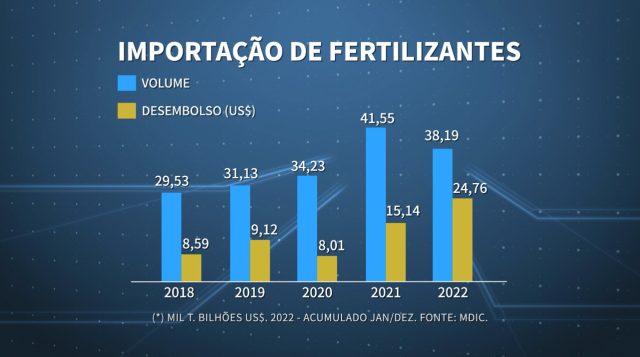In five years, Brazilian rural producers’ expenditure on fertilizer imports jumped by almost 200%. It went from US$8.59 billion in 2018 to US$24.76 billion in 2022.
As such, last year set a new benchmark for annual expenditure on fertilizer imports. In other words, it surpassed the then record of 2021 by more than US$9 billion, when the amounts committed were around US$15.14 billion.
Although expenditures increased from one year to the next, the volume of inputs imported by Brazil fell. This is because in 2021, purchases totaled 41.55 million tons. Last year, however, the total was 38.19 million tons of fertilizers. “Production costs have increased, one of the biggest pains in agribusiness” — Giovani Ferreira
In other words: in 2022, Brazil paid more to, in the end, have a smaller volume of fertilizers. This issue was highlighted by Canal Rural’s content director, Giovani Ferreira. He spoke about the subject in this week’s edition of the ‘AgroExport’ newsletter.
“With an 8% smaller volume, we spent 60% more. We spent almost US$ 25 billion to buy less fertilizers,” said Ferreira when participating in the ‘Mercado & Companhia’ news program this Tuesday (24). “Production costs have increased, one of the biggest pains in agribusiness,” continued the ‘AgroExport’ presenter.
Fertilizer imports: outlook for 2023
When reporting that, until 2021, the average price per ton of fertilizers was traded at around US$ 350.00, Giovani Ferreira recalled that the value almost doubled in 2022. Thus, the year ended with an average trade of around US$ 600.00. With this level, he warned: inputs will continue to affect the production costs of Brazilian agribusiness in the current harvest.
Even so, fertilizer imports by Brazil started off strong in 2023. In this sense, Ferreira reported, when talking to presenter Pryscilla Paiva, that the Port of Paranaguá (PR) unloaded the largest cargo of fertilizers in its history last week.
“There were 73 thousand tons in a single load. That’s a complete Panamax ship”, stated the content director of Canal Rural. Finally, he pointed out that the case of Paranaguá is not isolated. He stressed, however, that Brazil should register the same volume of fertilizer imports this month as in January 2022. “This is a sign that the market is booming,” he emphasized.
Source: Canal Rural

